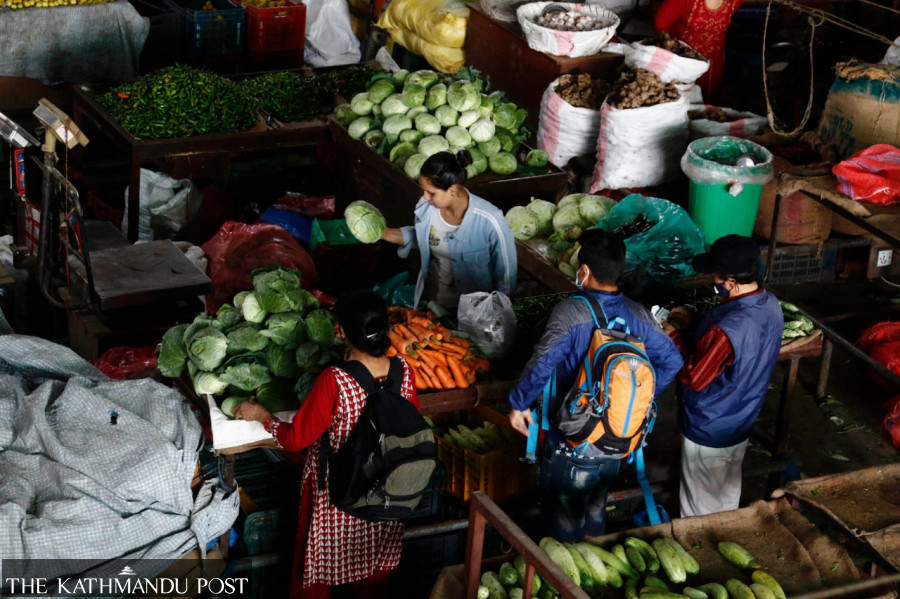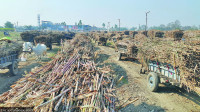Money
Vegetables cost more due to incessant rain, lockdown restrictions
Deliveries have declined to 450 tonnes daily from 600 tonnes due to the rains, officials say.
Krishana Prasain
Kathmandu Valley residents reeling from the pandemic received another wallop in the form of costlier vegetables, with traders attributing the jump in prices to incessant rain and lockdown restrictions.
As wholesale markets are running low on inventory due to supply disruptions, prices of kitchen staples such as potatoes, tomatoes and seasonal vegetables have risen sharply in the valley, traders said.
People in Kathmandu are bearing the brunt of an extended lockdown. Vendors are finding it hard to transport vegetables to market because of stay-home orders. Traders said prices of fresh produce shot up due to short supply caused by transportation controls. Higher freight charges have also pushed up retail prices, they said.
On Thursday, the wholesale price of local cauliflower was Rs70 per kg at the Kalimati Fruits and Vegetable Market, the country’s largest bazaar for fresh produce. But retailers were selling cauliflower at Rs140 per kg, double the wholesale price.
The wholesale price of string beans was Rs100 per kg, while bitter gourd was priced at Rs50 per kg, bottle gourd at Rs60 per kg, sponge gourd at Rs60 per kg and long cowpea at Rs60 per kg.
On the retail side, cabbage costs Rs85 per kg, bitter gourd Rs110 per kg, bottle gourd Rs120 per kg, and beans Rs70 per kg.
Local cucumber was being sold for Rs145 per kg, okra for Rs70 per kg, long bean for Rs90 per kg, squash for Rs80 per kg, sponge gourd for Rs140 per kg and green pumpkin for Rs90 per kg.
Binaya Shrestha, deputy director at the Kalimati Fruits and Vegetable Market Development Board, said that the daily supply of vegetables had declined to 450 tonnes for the last three days from 600 tonnes due to the rains.
The lockdown that began on April 29 has been extended for the fourth time until June 21, and this has also hit the supply chain, causing transportation costs to increase sharply, traders said. The increased cost of hauling has been passed on to consumers.
Shrestha said that the wholesale price had not increased much, but if the rains continue, it will damage crops and create obstacles in transportation. “If that happens, prices will increase sharply,” Shrestha said.
"Unruly retail prices need to be controlled by the local government and concerned departments with proper inspection," he added.
The Kalimati Fruits and Vegetable Market that is open for wholesale business till 10 am receives vegetables from Dhading, Kabhre, Nuwakot, Panchkhal, Makwanpur, Chitwan, Sarlahi, Bara and Parsa. The market used to receive around 700 tonnes of vegetables daily before the lockdown started.
Bijay KC, president of the Kalanki Vegetable Market, an agriculture market hosting 115 stalls, said that the monsoon rains had created havoc in the regular supply of vegetables leading to a hike in prices.
“Wholesale prices rose by 10 percent within a few days with a drop in supply. The price of vegetables will increase further if the rains continue,” KC said.
"The supply line from Chitwan has been cut off due to landslides at different places on the highway leading to Kathmandu. Deliveries plunged by more than half in just a few days," he added.
“We used to receive around 70 tonnes of vegetables daily before the monsoon, now we are getting only 40 tonnes,” he said. The monsoon in Nepal began on June 11 this year.
According to Nepal Rastra Bank, the country imported vegetables worth Rs12.99 billion in the first 10 months of the current fiscal year (mid-July to mid-May), a 14 percent rise year-on-year. During the same period in the last fiscal year, imports were valued at Rs11.40 billion.
Nepal buys vegetables like potato, lemon and onion and varied fruits from India.
The monsoon entered the country last Friday and it has been pouring since then. The weather forecaster is expecting above normal rainfall this season, and heavy floods and landslides are predicted which will damage monsoon crops ready to be harvested.




 18.95°C Kathmandu
18.95°C Kathmandu













